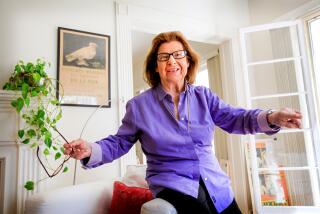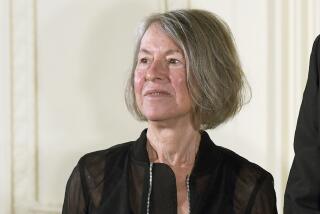Clare Boothe Luce Dies of Cancer at 84
- Share via
Clare Boothe Luce, author, playwright, former congresswoman and ambassador, died of cancer early Friday at her home in Washington.
The widow of Henry R. Luce, founder of the Time-Life publishing empire, was 84 and a Luce spokesman said she had been in failing health for some time.
From penniless beginnings, Clare Boothe Luce turned herself into a witty, celebrated figure in 1930s New York “cafe society”--a term she may well have coined--and then went on to add one achievement after another: successful playwright, two-term congresswoman during the pre-women’s liberation 1940s, and the first female U.S. ambassador.
What made her singularly interesting, in light of latter-day feminism, was that despite her self-reliant determination and ability, Mrs. Luce was a continuous object of criticism nearly all her life, particularly from women.
In a 1985 interview, when such criticism was long forgotten, she told a reporter she believed politics was “the worst of careers for women (because) you must have a real pleasure in reaching for the jugular, a killer’s instinct.”
But it was Mrs. Luce’s own “killer instinct,” at least in the perception of others, that made her a target. Writer Helen Lawrenson devoted a whole chapter of her memoirs to Mrs. Luce, calling the section, “The Delicate Monster.”
Mrs. Luce was an ardent feminist, but enough of a realist in her time to know her cool, blonde beauty would gain entree faster than her brains. “I discovered that it was still not a world where a woman could make a life for herself,” she once said. “Though I did, of course.”
So she was, biographer Wilfred Sheed wrote, “a bridge figure between the courtesan and the career girl.”
Clare Boothe Luce was born Anna Clare Booth (without an e ) April 10, 1903 in either New York, Tennessee, Chicago, or London--as biographical accounts (even her own) differed. Her father, a musician, left her chorus girl mother when she was very young.
Made Paper Flowers
Until her mother remarried, to a wealthy Connecticut doctor, the family finances erratically rose and fell with her courtships. As a result, young Clare had little formal education and, at one point in her teens, worked in a factory making paper flowers.
On the mother’s remarriage, Clare was treated to some fashionable European travel. Later, she would say that she had always wanted to be a writer, but her mother was determined that if Clare Booth could not be a great actress--early attempts at that had failed--she would at least marry a rich man.
On a 1920 transatlantic voyage, Clare met a wealthy, well-connected socialite and suffragette, Mrs. Oliver H. P. Belmont, which brought two results: Clare did some work for the women’s movement and she found her first husband, millionaire George Brokaw.
She emerged from the marriage in 1929 with a daughter, Ann, and a settlement of $26,000 a year for life.
Found Her Place
“The minute I got a divorce I had no doubts, I said to myself, ‘By God, I’m going to be my own woman,’ ” she said later. But she gave Brokaw some credit: “At least he gave me entree into a world in which later I found my place.”
That world also gave her the grist for her first book in 1930. “Stuffed Shirts”--again a phrase she probably coined--was a collection of satirical stories about New York society.
Determined to be a writer, she approached a social friend, Conde Nast, owner of both Vogue and Vanity Fair magazines, for a job. “I know your type, Clare,” she recalled his reply. “The first time you get a glamorous invitation to Palm Beach you’ll be off.”
Nast then went off to Europe and presumably forgot the conversation. But Clare Boothe, who added an e to her surname after launching her writing career, just went in to Vogue and sat down at an empty desk, pretending she had been hired. When the first week’s paychecks were handed out and there was no envelope for her, she passed it off as forgetfulness on Nast’s part.
The charade continued for six weeks. By the time Nast returned, Clare Boothe had met Vanity Fair’s managing editor, Donald Freeman, who reportedly fell in love with her. He made her his assistant editor.
Within three years she had Freeman’s job and was a social celebrity herself among the celebrities the magazine regularly covered.
Her first play, “Abide With Me,” opened on Broadway in 1934.
It was a failure and quickly closed. But in 1935 she married Henry Luce, who proposed to her on their third meeting and then divorced his wife.
Writer Lawrenson later referred to the couple as “Arsenic and Old Luce.”
In later interviews she admitted she dreamed of being a force on Luce’s Time. She claimed she conceived the original idea for Life, which Luce started in 1936. But her husband did not want her to participate.
Wrote Runaway Hit
So she wrote another play. In 1936, “The Women” opened on Broadway and became a runaway hit. It has since been translated into several languages, repeatedly performed on stage and twice made into a motion picture. As a scathing portrayal of rich predatory women interested only in catching and keeping their men, she later admitted she again used first-hand knowledge.
“The play is a satire,” she said. “Anyone who understands a satirist’s mind knows that he is someone who is deeply disappointed and takes his revenge in poking fun at the objects of his disillusionment.”
Biographer Sheed noted, “She had written a parody of her own type.”
In 1940 she switched to journalism and wrote “Europe in the Spring,” an account of her travels through Europe at the dawn of World War II. That same year she started what became a two-decade venture into conservative, profoundly anti-communist Republican politics, beginning with speeches in behalf of presidential candidate Wendell Willkie. Two years later she ran for Congress from Connecticut, won and served two terms.
But she did not again pursue writing. “What is interesting,” Sheed wrote, “is how quickly she backed away from her gift, almost as soon as she discovered it.”
As in the past, she had critics who claimed whatever she did had been accomplished with some outside help or unfair “feminine” advantage.
“It was said I won because I charmed the men. It was nothing of the sort. You cannot plumb the dislike men have for women in politics because government work is one field in which women cannot be discriminated against in salary.”
Ambassador to Italy
She retired in 1946, after the death of her daughter, Ann, in an accident, and was converted to Roman Catholicism by Bishop Fulton J. Sheen, later host of a popular television program.
She became such an ardent advocate of the faith that Pope Pius XII reportedly once admonished her, “But madam, I too, am a Roman Catholic.”
In 1953, after she failed to win a U.S. Senate nomination, President Dwight D. Eisenhower appointed her his ambassador to Italy, a post she resigned in 1957 due to a peculiar illness she claimed was caused by arsenic dripping from embassy ceilings.
When asked on quitting if she felt being a woman had left her at a disadvantage as a diplomat, she replied: “I couldn’t possibly tell you. I have never been a man.”
Eisenhower then nominated her as ambassador to Brazil, but a furor ensued. Sen. Wayne Morse of Oregon proved to be a fiery opponent and she was obliged to withdraw her nomination. She issued a statement saying that “my difficulties, of course, go some years back and began when Sen. Morse was kicked in the head by a horse,” a reference to a 1951 accident when a mare indeed had broken Morse’s jaw.
In 1985 she told her interviewer: “If I had it to do over again I would never have left the theater. I wouldn’t have scattered my talents.”
When her husband died in 1967, she moved to a $4-million estate in Hawaii, pursuing such hobbies as raising poodles, training birds and doing mosaics. Conservative politics remained dear, and she was a staunch supporter of Sen. Barry M. Goldwater (R-Ariz.) and Richard M. Nixon.
In 1981, she was appointed by President Reagan to his Foreign Intelligence Advisory Board, where she had also served under Presidents Nixon and Gerald R. Ford. The panel is designed to assess American foreign intelligence abroad.
Mrs. Luce, whose survivors include her husband’s two sons and 10 step-grandchildren, was once asked, late in life, if she had any regrets. “I wish I’d kept a diary,” was her reply.
A funeral Mass has been scheduled Tuesday at St. Patrick’s Cathedral in New York with another service Wednesday at St. Stephen Martyr Church in Washington.
More to Read
Sign up for our Book Club newsletter
Get the latest news, events and more from the Los Angeles Times Book Club, and help us get L.A. reading and talking.
You may occasionally receive promotional content from the Los Angeles Times.










